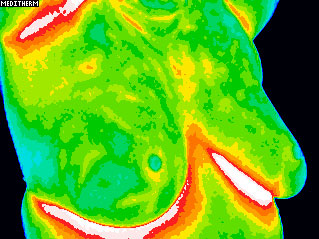 Do you have sore breasts before your period or during ovulation? This could be a sign of a condition called Estrogen Dominance in Western medicine or Liver Stagnation in Eastern medicine. Frequently, women experiencing these issues have fibrocystic breasts. The term “Fibrocystic Breasts” can be used to describe breasts that are tender during different phases of the menstrual cycles. Or, this label can be applied to those with lumpy or fibrous breasts that fluctuate during the menstrual cycle who may or may not have swelling or tenderness.
Do you have sore breasts before your period or during ovulation? This could be a sign of a condition called Estrogen Dominance in Western medicine or Liver Stagnation in Eastern medicine. Frequently, women experiencing these issues have fibrocystic breasts. The term “Fibrocystic Breasts” can be used to describe breasts that are tender during different phases of the menstrual cycles. Or, this label can be applied to those with lumpy or fibrous breasts that fluctuate during the menstrual cycle who may or may not have swelling or tenderness.
The most common clues your breasts can give you about your overall health are the state of your hormonal balance and the health of your hormone clearance pathways, including the state of your Liver and Large Intestine organ systems. There are some very easy things you can do to improve these detoxification routes.
First, concentrate on Liver health. The Liver breaks down all hormones. Therefore it is the first and primary site for estrogen metabolism. We need to break down estrogen after it has done its job in the body, or we can accumulate too much. Fibrocystic breasts can be a sign that you are in an estrogen dominate state, which can lead to tissue changes in the breasts causing an increase in heterogeneous texture. When my patients present with this issue, I think first about strengthening the Liver. I may prescribe Chinese herbal formulas, nutritional supplements or dietary counseling to assist the Liver complete its tasks.
However, the Liver may be doing its job well, and a women can still suffer from fibrocystic breasts! Just because the Liver breaks down estrogen and other hormones does not mean that the Large Intestine is excreting them from the body. If transit time through the bowel is slow, the body will reabsorb those broken down estrogen products, which can impact the delicate hormonal balance. Women having less than three bowel movements per week have up to five times the chance of developing fibrocystic breasts.
Simple nutritional supplements and herbal support for estrogen metabolism and breast health:
- Lactobacillus acidophilus-can normalize bowel movements, which will improve the excretion of estrogen
- Cut out caffeine
- Vitamin E in the form of d-alpha-tocopherol at a dose of 400-800IU for at least eight weeks before assessing efficacy
- Two-three grams of Evening Primrose Oil can decrease breast tenderness-whether it is associated with the menstrual cycle or continues all month.
- The thyroid, pituitary, ovaries all function harmoniously in healthy cycling women. However, some women need help in the form of Aqueous iodine, which is the only form of iodine that will not affect the thyroid in a negative way. Common prescription doses range from 3-6 mg per day.
- Vitamin B6 can be very helpful in assisting the Liver to metabolize estrogen. Just be careful to keep the dose of total B6 consumed from all dietary supplements under 100 mg/day. Otherwise you may experience neuralgia.
Another breast issue that postpartum women face is milk regulation. Some women make milk long after they are done breast feeding, while others need all the help they can get to encourage lactation. Do you still leak milk from your breasts months after you stopped breast feeding? High levels of prolactin is normal during breast feeding. It is our contraception hormone, which is supposed to induce milk production and prevent ovulating while breast feeding. However, this natural contraception works best if the baby suckles all day long, not just at discrete feedings. So, while your chances of getting pregnant are lower, unless your child suckles constantly, just because you are breast feeding does not mean you can not get pregnant.
There are numerous Chinese herbal formulas and Western herbs used to treat lactation issues. For example Vitex and Mai Ya can decrease lactation for those weening their wee ones. While Qing Pi, Pu Gong Ying and Fenugreek can increase milk production. There are several other treatments utilizing both acupuncture and moxabustion techniques and personalized Chinese herbal formulas to regulate breast tissue.
So, what are your breasts telling you? Ready to listen?





